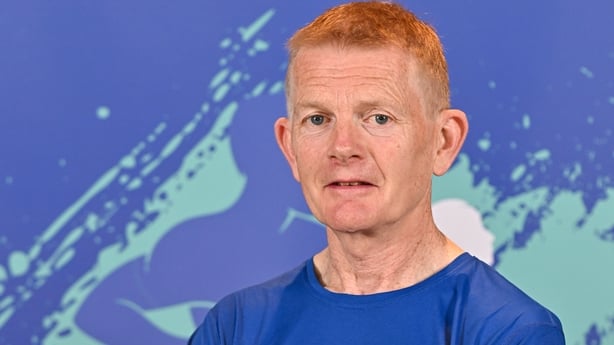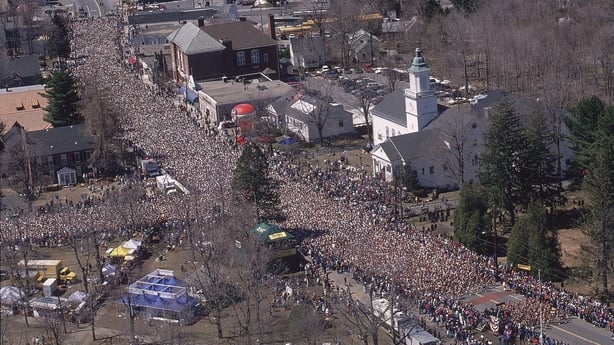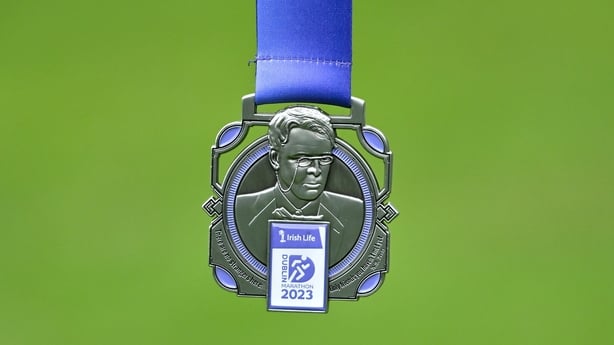Running coach Brendan Hackett knows the importance of planning and preparation better than anyone, but if Olympians can come a cropper on the big day, he can appreciate how easy it would be for many of the 20,000 expected to compete in the Irish Life Dublin Marathon to make some elementary mistakes next month.
Hackett has straddled GAA and athletics coaching for more than 40 years. In 2020 he steered Ballymun Kickhams to a Dublin county title, last year he coached Martin Hoare to a national title as he was the first Irishman across the line in Dublin.
At the moment athletics is taking the front seat – he left Kickhams last year and is enjoying the break from football and is a coaching expert for the event on Sunday, 29 October.
He has a range of runners under his wing, from Hoare to a clutch of runners simply hoping to make it around in their maiden 26.2 mile excursion.
"It's about getting things right on the day. It’s amazing how many people do silly things," he tells RTÉ Sport. "You think what you’re are doing is common sense, but quite often it’s not."
Having a plan is crucial, but even that doesn’t allow for human error and anxieties.
Common sense can go out the window on the day
Hackett recalls the 2004 Olympic Games in Athens, where he worked as a sports psychologist with Team Ireland.
He was on a bus with athletes and fellow bound for the Olympic Stadium for that day’s action, when all of a sudden there were loud shouts from the back.
"We must have been about a mile down the road and the driver stopped up," he recalls. "It turned out the pole vaulter forgot his pole.
"As a sports psychologist you would always say to make a list, make a plan, but then common sense can go out the window on the day."
By his own admission, Hackett, "fell into" coaching.
Gaelic football was his first love, and while doing his PE undergraduate, his team found themselves managerless and he stepped forward.
He was under the impression it was a temporary sideline stint, but in reality, he would never really return to playing.
Feeling obligated to his classmates to remain in charge given they kept on winning, it was the first rung of the coaching ladder.
"I just got a huge buzz out of it," he tells RTÉ Sport.
Having moved to Leixlip, he continued coaching before moving into inter-county management with Longford and Offaly. A stint with Westmeath would follow in later years.

As a gym owner, sport was both business and pleasure, yet even as he forged a path in GAA, Hackett was an avid 5km and 10km road runner. Cross-country itches were also scratched.
"Running became the competitive outlet while managing," he says.
A Masters Degree in Sports Psychology in the early 1990’s not only steered him further along the coaching path, it meant he crossed paths with Eamonn Coghlan.
Somewhat ahead of the curve, the pair combined for workshops to highlight the benefits of sports psychology He was also assisting Coughlan in his attempt to run the first sub four-minute mile as a Masters Runner in 1994.
Having started a column in Irish Runner magazine, athletes – predominantly middle distance runners – began to make contact and so athletics began to firmly take hold.
"In GAA, you could, as a group, train twice a week and have a game at the weekend. Somewhere around a 70/30 training/competition ratio. You are taking a group and devise a generic session that is generic to hitting the common denominator, without maybe getting everyone precisely.
"For athletes, it could be 90+ ratio training to competition. For marathon runners, it could be only two races a year. A lot of time is spent to devising training, there is more feedback in a one-to-one situation. It’s a totally different relationship."
His own marathon debut was fortuitous to say the least.
Hackett assisted Coghlan’s charity group of runners that took part in Boston and New York marathons, popping up at various points of the course, sometimes running the final miles in support.

That was his aim for the centenary Boston marathon in 1996, but the fact it was a point-to-point course scuppered his coaching plans. Without ever having run more than 10 miles, he decided to go for it, one of the 36,748 competitors at the start line.
"It wasn’t ideal preparation," he readily admits, "but I came from a fairly educated background, so I knew the best way to approach it.
I understand for people where the goal is just to finish the marathon, where time is irrelevant
"I remember the exhilaration of coming down the finishing line, just the joy of completing it.
"I understand for people where the goal is just to finish the marathon, where time is irrelevant. The achievement is doing 26 miles, and I’ll never forget that buzz, and completely different to getting a PB."
More marathons would follow, but the pull of coaching was always stronger. Sports psychology was in its infancy in the GAA, but at the turn of the century he worked with six different counties in seven years, while at the same time developing elite athletes for Olympic Games and national championships.
Under the tutelage of Hackett, Martin Hoare navigated the Dublin course last year in a time of 2:20:22.
The Celbridge AC athlete has yet to confirm he will defend his title due to family and work commitments, but either way, Hackett will have a vested interest in more than 30 athletes taking part next month, from a Masters runner looking to break two and a half hours, to a group of first timers looking to get across the line in double that time.

The Dublin marathon he says has "changed phenomenally" in 20 years.
In 2004, when 8,500 athletes crossed the finish line, he cycled pretty much the entire course to help cross-country champion Noel Cullen assess whether an Olympic dream could be turned into a reality.
"I gave a seminar at the Expo the day before and a lot of Americans turned up at the talk. Knowing what Boston and New York marathons are like with the streets lined, I warned them that it was a Bank Holiday in Dublin and there would be large stretches where you wouldn’t see anyone."
Now Dublin is the fourth largest marathon in Europe, with 22,500 entries made available for this year’s event.
It's about finding your pace and being comfortable at it
"On the day there is just so much encouragement for people."
With just six weeks to go, there is still enough time left for those who have slipped somewhat from their training plans.
As far as Hackett is concerned, this year’s tag line, Find Your Pace, is central to a successful marathon navigation
"I love that line because that is key. It’s about finding your pace and being comfortable at it."
Don't miss Brendan Hackett's tips for those six weeks out from Dublin Marathon, tomorrow at www.RTÉ.ie/sport and on the RTÉ News app.


